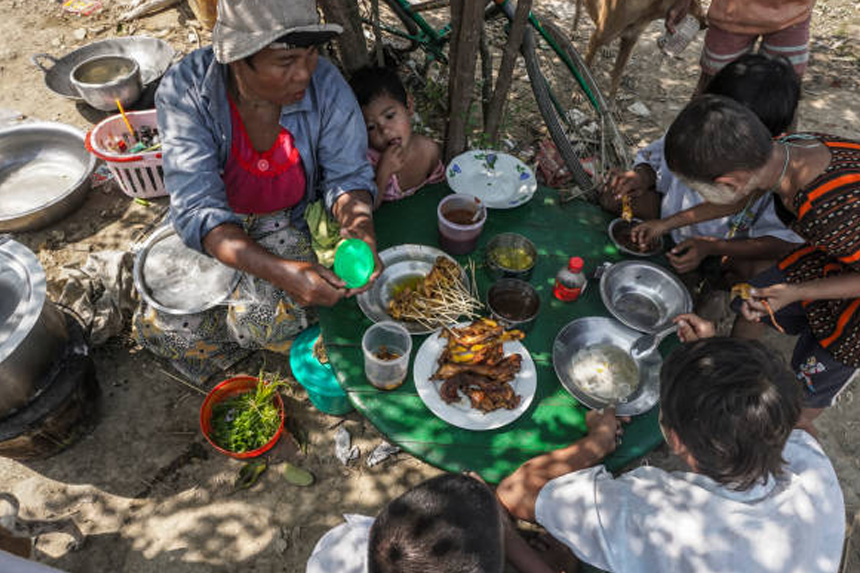March saw Chaw Su’s world destroyed when the military junta of Myanmar forcibly enlisted her husband to fight in the continuing civil conflict. Once dependent on her husband’s income to maintain their three small children, the 25-year-old widow now has an unclear future without him.
- Why Was Conscription Enforced in Myanmar?
- How Did Chaw Su Lose Her Husband?
- Why Are Families Left in Financial Hardship?
- How Do Other Widows Cope with Their Loss?
- What Drives Young People to Resist Conscription?
- How Are Women Contributing to the Resistance?
- What Happens to Those Who Flee Myanmar?
- How Is Chaw Su Managing After Her Husband's Death?
Dozens Killed in Attack on Sudan Camp Amid Civil War
She remembers: “We were always poor and struggled, but life was much more bearable with him.” Four months following his induction, Chaw Su was devastated to learn that her husband had been slain on the front lines—a terrible reality all too often experienced by families all around Myanmar.
Why Was Conscription Enforced in Myanmar?
The junta, or military government of Myanmar, declared mandatory conscription for all men aged 18 to 35 and all women aged 18 to 27 in February. Following the coup in 2021 that removed the democratically-elected government of Aung San Suu Kyi, the action was meant to strengthen the military might of the junta facing an increasing civil war. With intense warfare erupting throughout the nation, the junta has been fighting several insurgent groups, including ethnic armed organizations and the People’s Defence Forces (PDFs).
Seizing up to two-thirds of Myanmar, rebel groups grew ground-based, and their hold on the regime has been progressively undermined. This fall-off has forced the military government to implement mandatory conscription; an action analysts caution could aggravate the conflict even more.
How Did Chaw Su Lose Her Husband?
Chaw Su’s spouse was one of many men recruited from their village to assist the junta’s military operations. In July, she got a call from him soon after he had gone for training. He told her he would be sent to Karen State, among the epicenters of the merciless war.
“He stated he would be sent to the frontline for two weeks and would call me when he returned to base,” Chaw Su claims. “It was the first and last note he sent me.”
Days later, Chaw Su answered a call from a military commander delivering the heartbreaking news her husband had been slain.
“I had lost all sense. With his remarks, the officer sought to comfort me, but I felt that my life was ended,” she says, her voice still raw.
Why Are Families Left in Financial Hardship?
Like many families, Chaw Su was paid for her husband’s service. However, when he was conscripted, the family earned a pitiful 70,000 kyats (about $21), far from enough.
Month after month, no more financial help showed up. As with full-rank troops, conscripts are entitled to pay and compensation upon death in duty, according to the military. A military spokesman did admit delays, though, noting that inadequate records can cause payments to stall.
The families of conscripted soldiers often struggle both emotionally and financially and remain in the dark about the location of their loved ones despite the junta’s guarantees. “We had no support from the military,” recalls Chaw Su, who barely makes ends meet at various jobs in her village.
How Do Other Widows Cope with Their Loss?
Chaw Su is not bereaved alone. A widow in her 60s, Soe Aye, hasn’t heard from her son since he was drafted six months ago. She said sobbing, “My son joined the military to feed his mother.” “I wish I hadn’t let him go.”
Now battling ill health, Soe Soe Aye depends on her younger daughter for help; she is resolved to stay hopeful, yet “I only wish to see my son. Her voice shaking, she continues, “I lack the strength to face this.”
What Drives Young People to Resist Conscription?
Many young individuals have sought to flee the junta’s rule in the face of conscription. Yangon-born 20-year-old Kan Htoo Lwin remembers his rigorous training before being assigned to the frontline. “The training was grueling; they threatened that if anyone tried to escape, their homes would be burned,” he claims.
Three months of training later, Kan Htoo and two other conscripts grabbed a chance to flee when their convoy stopped. They left under darkness and went miles, halting only when tired. “We ran once it darkened while they were occupied with security inspections. We stopped only at night,” he adds.
They finally arrived in a southern Shan state township where Kan Htoo joined a PDF. “I hated the army even more after the training,” he says. “I joined the resistance since I wanted not to fight for a government that only brought suffering to my people.”
Although Kan Htoo and his friends enjoy some degree of protection, many others hide out out of worry about the fallout from their defection.
How Are Women Contributing to the Resistance?
Although men have been primarily targeted in the conscription campaigns, women have also suffered. Twenty-year-old Zue Zue from Yangon made the tough choice to give up her aspirations of being a Chinese translator and enlisting in the Special Operation Force (SOF) within the PDFs.
“Now my objective is to end this era of military dictatorship and make peace for our generation,” Zue Zue says. Her choice captures the increasing urgency among the young people of Myanmar, many of whom are resorting to armed opposition to topple the regime and guarantee a future free from military rule.
What Happens to Those Who Flee Myanmar?
Many Burmese people, including engineers like Min Min, moved to surrounding Thailand to evade military duty as conscription campaigns grew more intense. Now, on an education visa, Min Min needs help locating employment and committing his credentials—many Burmese immigrants to Thailand work low-paying manual labor jobs, frequently under employer exploitation.
“I’m worried about the living expenses,” Min Min notes. “I have to locate manual labor employment; I have no choice.”
Meanwhile, Thai officials have tightened their application of immigration rules; many Burmese immigrants now run the danger of expulsion. “I have seen Burmese engineers working illegally and only paid around 12,000 Thai baht ($355), the same as the salary of migrant manual workers,” he says.
Living as an undocumented migrant worries Min Min intensely, mainly because his visa has almost expired.
How Is Chaw Su Managing After Her Husband's Death?
Chaw Su’s life has been a continual struggle for survival in Myanmar. Working long hours at several odd jobs, she makes just enough to support her kids. “It’s difficult to tell other people the battle I’m going through,” she says. “Everything has changed so much.” Though it seems unattainable, I want a brighter future for my kids.”
Families like Chaw Su’s would find the human cost of Myanmar’s civil war and mandatory conscription to be unbounded. The cost to ordinary people—especially women and children—remains terrible while the conflict persists.








